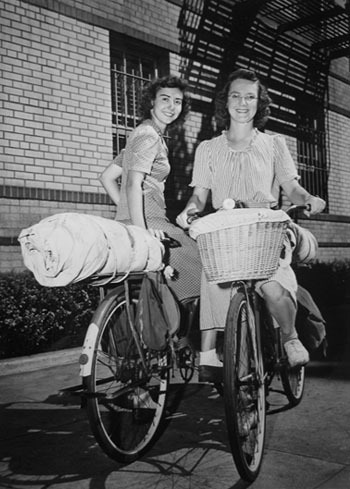The Lure of the Open Road
I don't read many travelogues, but this one is different. In 1944, Doris Roy and Thelma Popp rode their bicycles out of Buffalo, New York, and traveled through Pennsylvania and Ohio, following the rivers to New Orleans. From there, they went east, up the eastern seaboard, and returned to Buffalo. It's a remarkable story of two strong, capable women setting off on an adventure.
They rode a single speed and a two-speed loaded will all manner of camping equipment long before the days of ultra-light tents, sleeping bags, and titanium cook pots. They built campfires and used canned heat for cooking. For those of us who live on constant email, consider this:
"Good Lord! A whole summer without mail. I’d die if I didn’t know when Bud’s unit got shipped out."
"Imagine not hearing the top jive on Hit Parade for a whole summer!"
Now go read the whole thing after these excerpts. It's well worth your time.
The Lure of the Open Road.
Wartime wandering through the Eastern states by bicycle, truck, and riverboat. 1944.
by Thelma Popp Jones. 2007.
(LINK)
In 1944, a dear friend, Doris Roy, and I undertook an adventurous journey that we dreamed of during countless hikes together over our college holidays. We had been Camp Fire Girls together, loving the out-of-doors, camping and hiking the open road. Our dreams finally developed into a plan to ride bicycles from our home in Buffalo, New York, to Cairo, Illinois, where the Ohio River met the Mississippi. We admired Mark Twain’s adventures, had read his Life on the Mississippi, and sought to follow his path to the Midwest.
We were 21 years old, just graduated from college: Doris Roy from Michigan State and Thelma Popp from Buffalo State College. We often referred to each other as "Mouse," as we were two blind mice wearing glasses. I had the nickname "Poppy," characteristic of my last name.
World War II affected our college life as most of the male student body joined one of the services. Women assumed some of their roles by taking jobs in armament industries. During the summer, I worked from early morning to evening in a public school caring for infants whose mothers were working in aircraft factories or other related industries.
But now, before starting our careers, we decided that the coming summer after graduation would be the ideal time to have our adventure. We had a limited period of time to accomplish this. I had signed a contract to begin teaching first grade in Middleport, New York, on the Erie Canal on September 4, 1944. And so - with the leanest of equipment - we made our preparations and were ready to leave on June 22, 1944.
Part 1
June 22 - July 21, 1944
Leaving
Buffalo
This was the day, the first day of our adventure by bicycle. It was the reality of a dream one day toward completion. It was the beginning of an adventure, months of hoboing through the country to live as we pleased and go where we willed. And now, at 7:30 a.m., the Roy family arrived at the Popp residence at 134 Oakgrove Avenue, Buffalo, New York, to share breakfast together with their children, Doris and Thelma. Perhaps in the future we would be looking back at the wealth and the pleasure of that breakfast and the kind words of our parents still attempting to discourage us. Perhaps it was a ridiculous venture, but we were determined never to be put into the category with those who say, "I always wanted to, but never did." Out on the driveway were standing two beautiful new bicycles. Both were blue and their chrome fittings shone like silver in the sun. A previous checkup reported all parts oiled and geared for efficiency. These were our wartime Victory bicycles, lightweight and practical. Thelma’s bicycle had but one speed, and Doris’s had two. But an ordinary bicycle never looked like this! Every extremity was used as a carrier. The usual rack over the rear wheel was extended to hold the weight of a sleeping bag and duffle, and below, saddle bags bulged on either side of the wheels. Strapped to the handlebars was a wicker basket outfitted with oil cloth for protection against inclement weather. These were our bicycles - carnivals on wheels! We were all keyed up to this exciting moment.
..."Keep dry! Wear your hats!"
Mr. Popp clicked the lever of the camera and aimed at us through the lens. We pedaled down the drive, into the street, and out into the world. Down over the rough brick pavement, up the viaduct and over the freight yards we pumped and sweated. The outskirts of the city were an endless line of mills and factories belching smoke and soot. The odor of the chemicals stung our nostrils and dried our throats. We were glad to leave the city.
We must have been a humorous sight - bicycles bulging at all angles, tin cans jangling as we hit the bricks, and riders vainly attempting to keep their floppy hats from being carried off in the wind.
...Months before we embarked, our friends bonded in a mutual attempt to discourage our trip. "Foolishness!" they called it.
"How are you going to live in one dress all summer? And where on earth will you do your laundry?"
"What’ll you do when there’s no creek to take a bath in?"
"Don’t think you can always make a wet wood fire in the pouring rain."
"I know. You’ll get to Gowanda and wire home for some blister ointment and a feather pillow, and then beg somebody to take your seat and let you stand up on the bus." "Good Lord! A whole summer without mail. I’d die if I didn’t know when Bud’s unit got shipped out."
"Imagine not hearing the top jive on Hit Parade for a whole summer!"
They pelted us with a myriad of queries. We had answers to all of them... well, at least most of them. And for those unanswered, we would trust to the luck we hoped we possessed.
One dress nothing. We were equipped for rain, sun, snow, and swimming. Riding along the road in shorts, letting the wind blow through the toes of my huraches was the coolest form of travel. But those brisk mornings, which were very few, found us bundled in dungarees and thick sweat shirts. And every time we dug for the camera... out fell the rubbers.
What if it was storming? Hadn’t we always found shelter on our hikes before? If we could light a fire on one match, why worry about a little rain?
Maybe we were over confident. Maybe our egos were dangerously expanding. We didn’t wonder; we didn’t worry. We trusted an inner feeling of safety and strength in our independence.
Labels: bicycle camping, bicycle touring, lure of the open road, thelma popp jones





0 Comments:
Post a Comment
<< Home